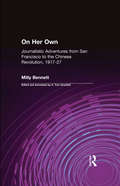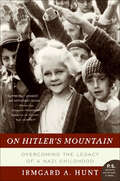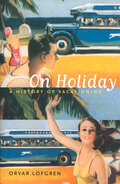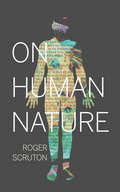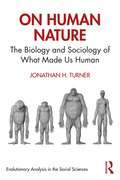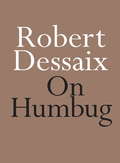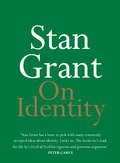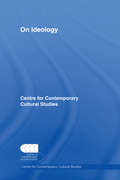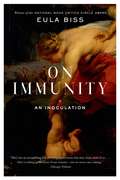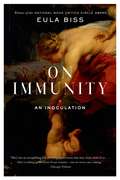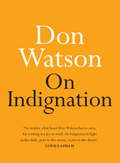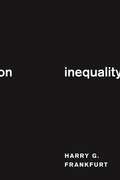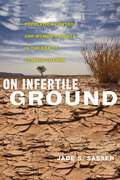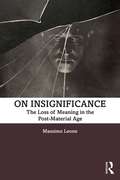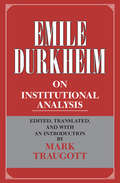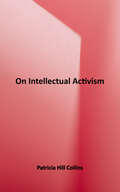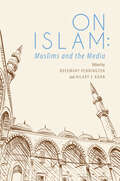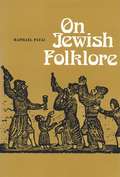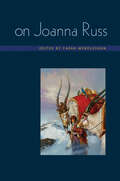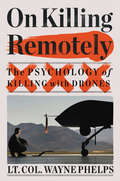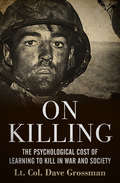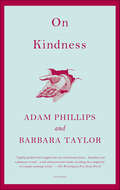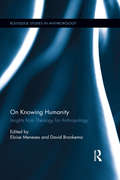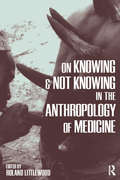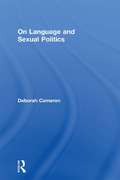- Table View
- List View
On Her Own: Journalistic Adventures from San Francisco to the Chinese Revolution, 1917-27
by A.Tom Grunfeld Milly BennettBorn in 1897, Milly Bennett lived an extraordinary life that led from her native San Francisco, to Honolulu, to China for the revolution, to the Soviet Union on the eve of World War II, to the Spanish Civil War, and home again, a journey punctuated with many love affairs, triumphs, and disappointments. This memoir of Milly's early years through her extended stay in China, places the current political turmoil there into a broader historical perspective. Nominally an autobiography of a remarkable woman and her brief time in China, it goes beyond the narration of an individual life by contributing details of a period of great instability, as well as exploring the sensitive topic of the involvement of foreigners in the internal politics of China.
On Hitler's Mountain: Overcoming the Legacy of a Nazi Childhood
by Irmgard A. HuntA German woman recounts her youth during World War II under Hitler’s regime in this “richly texture memoir” (Publishers Weekly).Growing up in the beautiful mountains of Berchtesgaden—just steps from Adolf Hitler’s alpine retreat—Irmgard Hunt had a seemingly happy, simple childhood. In her powerful, illuminating, and sometimes frightening memoir, Hunt recounts a youth lived under an evil but persuasive leader. As she grew older, the harsh reality of war—and a few brave adults who opposed the Nazi regime—aroused in her skepticism of National Socialist ideology and the Nazi propaganda she was taught to believe in.In May 1945, an eleven-year-old Hunt watched American troops occupy Hitler’s mountain retreat, signaling the end of the Nazi dictatorship and World War II. As the Nazi crimes began to be accounted for, many Germans tried to deny the truth of what had occurred; Hunt, in contrast, was determined to know and face the facts of her country’s criminal past.On Hitler’s Mountain is more than a memoir—it is a portrait of a nation that lost its moral compass. It is a provocative story of a family and a community in a period and location in history that, though it is fast becoming remote to us, has important resonance for our own time.
On Holiday: A History of Vacationing (California Studies in Critical Human Geography #6)
by Orvar LöfgrenLöfgren takes us on a tour of the Western holiday world and shows how two centuries of "learning to be a tourist" have shaped our own ways of vacationing. We see how fashions in destinations have changed through the years, with popular images (written, drawn, painted, and later photographed) teaching the tourist what to look for and how to experience it. Travelers present and future will never see their cruises, treks, ecotours, round-the-world journeys, or trips to the vacation cottage or condo in quite the same way again. All our land-, sea-, and mindscapes will be the richer for Löfgren's insights.
On Human Nature
by Roger ScrutonIn this short book, acclaimed writer and philosopher Roger Scruton presents an original and radical defense of human uniqueness. Confronting the views of evolutionary psychologists, utilitarian moralists, and philosophical materialists such as Richard Dawkins and Daniel Dennett, Scruton argues that human beings cannot be understood simply as biological objects. We are not only human animals; we are also persons, in essential relation with other persons, and bound to them by obligations and rights. Our world is a shared world, exhibiting freedom, value, and accountability, and to understand it we must address other people face to face and I to I.Scruton develops and defends his account of human nature by ranging widely across intellectual history, from Plato and Averroës to Darwin and Wittgenstein. The book begins with Kant's suggestion that we are distinguished by our ability to say "I"—by our sense of ourselves as the centers of self-conscious reflection. This fact is manifested in our emotions, interests, and relations. It is the foundation of the moral sense, as well as of the aesthetic and religious conceptions through which we shape the human world and endow it with meaning. And it lies outside the scope of modern materialist philosophy, even though it is a natural and not a supernatural fact. Ultimately, Scruton offers a new way of understanding how self-consciousness affects the question of how we should live.The result is a rich view of human nature that challenges some of today's most fashionable ideas about our species.
On Human Nature: The Biology and Sociology of What Made Us Human (Evolutionary Analysis in the Social Sciences)
by Jonathan H. TurnerIn this book, Jonathan H. Turner combines sociology, evolutionary biology, cladistic analysis from biology, and comparative neuroanatomy to examine human nature as inherited from common ancestors shared by humans and present-day great apes. Selection pressures altered this inherited legacy for the ancestors of humans—termed hominins for being bipedal—and forced greater organization than extant great apes when the hominins moved into open-country terrestrial habitats. The effects of these selection pressures increased hominin ancestors’ emotional capacities through greater social and group orientation. This shift, in turn, enabled further selection for a larger brain, articulated speech, and culture along the human line. Turner elaborates human nature as a series of overlapping complexes that are the outcome of the inherited legacy of great apes being fed through the transforming effects of a larger brain, speech, and culture. These complexes, he shows, can be understood as the cognitive complex, the psychological complex, the emotions complex, the interaction complex, and the community complex.
On Humbug
by Robert DessaixWith his trademark eloquence and humour, Robert Dessaix, one of Australia's eminent writers, tackles humbug in the modern world-the tide of mumbo jumbo where words fall short of what they mean and motivations are not always what they appear.
On Identity
by Stan GrantWhy does identity demand a choice between black and white? Tribalism, nationalism and sectarianism are dividing the world into us and them. Are we hard wired for hate? Stan Grant argues that it is time to leave identity behind and to embrace cosmopolitanism. On Identity is a meditation on hope and community.'Love is always the answer, it is said. Not if you are trying from somewhere in the Aboriginal domain to answer the cruel question, "Are you black or white?" Mapping family ties or finding a sense of self should be about love, but in the end, it is too often about politics. You must read this book if you have wondered why we make the choices we do.' MARCIA LANGTON
On Ideology
by CccsFirst published in 2006. Routledge is an imprint of Taylor & Francis, an informa company.
On Immunity: An Inoculation
by Eula BissOne of New York Times Best 10 Books of 2014. <P><P> Why do we fear vaccines? A provocative examination by Eula Biss, the author of Notes from No Man's Land, winner of the National Book Critics Circle Award<P> Upon becoming a new mother, Eula Biss addresses a chronic condition of fear--fear of the government, the medical establishment, and what is in your child's air, food, mattress, medicine, and vaccines. She finds that you cannot immunize your child, or yourself, from the world.<P> In this bold, fascinating book, Biss investigates the metaphors and myths surrounding our conception of immunity and its implications for the individual and the social body. As she hears more and more fears about vaccines, Biss researches what they mean for her own child, her immediate community, America, and the world, both historically and in the present moment. She extends a conversation with other mothers to meditations on Voltaire's Candide, Bram Stoker's Dracula, Rachel Carson's Silent Spring, Susan Sontag's AIDS and Its Metaphors, and beyond. On Immunity is a moving account of how we are all interconnected--our bodies and our fates.<P> Chosen for Mark Zuckerberg's "A Year of Books"
On Immunity: An Inoculation
by Eula BissA New York Times Best SellerA National Book Critics Circle Award FinalistA New York Times Book Review Top 10 Book of the YearA Facebook "Year of Books" SelectionOne of the Best Books of the Year* National Book Critics Circle Award finalist * The New York Times Book Review (Top 10) * Entertainment Weekly (Top 10) * New York Magazine (Top 10)* Chicago Tribune (Top 10) * Publishers Weekly (Top 10) * Time Out New York (Top 10) * Los Angeles Times * Kirkus * Booklist * NPR's Science Friday * Newsday * Slate * Refinery 29 * And many more...Why do we fear vaccines? A provocative examination by Eula Biss, the author of Notes from No Man's Land, winner of the National Book Critics Circle AwardUpon becoming a new mother, Eula Biss addresses a chronic condition of fear-fear of the government, the medical establishment, and what is in your child's air, food, mattress, medicine, and vaccines. She finds that you cannot immunize your child, or yourself, from the world. In this bold, fascinating book, Biss investigates the metaphors and myths surrounding our conception of immunity and its implications for the individual and the social body. As she hears more and more fears about vaccines, Biss researches what they mean for her own child, her immediate community, America, and the world, both historically and in the present moment. She extends a conversation with other mothers to meditations on Voltaire's Candide, Bram Stoker's Dracula, Rachel Carson's Silent Spring, Susan Sontag's AIDS and Its Metaphors, and beyond. On Immunity is a moving account of how we are all interconnected-our bodies and our fates.
On Indignation
by Don WatsonCorrosive, mad and frequently fatal, indignation is a great destructive force in human affairs, and just as often a wellspring of mirth and merriment. Don Watson traces this seemingly ineradicable emotion in a journey that takes us, via his forebears, Flaubert and The Sopranos, from the Old Testament to Donald Trump.Trump's pitch had less to do with offering voters money and security than with offering them vengeance. He exploited the anger we feel when we are slighted or taken for granted, turning the politics of a sophisticated democracy into something more like a blood feud. He promised to restore dignity, slay enemies, re-make the world according to old rites and customs. He stirred indignation into tribal rage and rode it into the White House.It was a scam, of course, but wherever there is indignation, stupidity and lies abound.'Indignation is both seductive and contagious, and transforms society and politics. Don Watson's essay is penetrating, astringent, witty and disturbing. It must be read, carefully.'BARRY JONES
On Inequality
by Harry G. FrankfurtEconomic inequality is one of the most divisive issues of our time. Yet few would argue that inequality is a greater evil than poverty. The poor suffer because they don't have enough, not because others have more, and some have far too much. So why do many people appear to be more distressed by the rich than by the poor?In this provocative book, the #1 New York Times bestselling author of On Bullshit presents a compelling and unsettling response to those who believe that the goal of social justice should be economic equality or less inequality. Harry Frankfurt, one of the most influential moral philosophers in the world, argues that we are morally obligated to eliminate poverty--not achieve equality or reduce inequality. Our focus should be on making sure everyone has a sufficient amount to live a decent life. To focus instead on inequality is distracting and alienating. At the same time, Frankfurt argues that the conjunction of vast wealth and poverty is offensive. If we dedicate ourselves to making sure everyone has enough, we may reduce inequality as a side effect. But it's essential to see that the ultimate goal of justice is to end poverty, not inequality.A serious challenge to cherished beliefs on both the political left and right, On Inequality promises to have a profound impact on one of the great debates of our time.
On Infertile Ground: Population Control and Women's Rights in the Era of Climate Change
by Jade S. SasserA critique of population control narratives reproduced by international development actors in the 21st century Since the turn of the millennium, American media, scientists, and environmental activists have insisted that the global population crisis is “back”—and that the only way to avoid catastrophic climate change is to ensure women’s universal access to contraception. Did the population problem ever disappear? What is bringing it back—and why now? In On Infertile Ground, Jade S. Sasser explores how a small network of international development actors, including private donors, NGO program managers, scientists, and youth advocates, is bringing population back to the center of public environmental debate. While these narratives never disappeared, Sasser argues, histories of human rights abuses, racism, and a conservative backlash against abortion in the 1980s drove them underground—until now. Using interviews and case studies from a wide range of sites—from Silicon Valley foundation headquarters to youth advocacy trainings, the halls of Congress and an international climate change conference—Sasser demonstrates how population growth has been reframed as an urgent source of climate crisis and a unique opportunity to support women’s sexual and reproductive health and rights. Although well-intentioned—promoting positive action, women’s empowerment, and moral accountability to a global community—these groups also perpetuate the same myths about the sexuality and lack of virtue and control of women and the people of global south that have been debunked for decades. Unless the development community recognizes the pervasive repackaging of failed narratives, Sasser argues, true change and development progress will not be possible. On Infertile Ground presents a unique critique of international development that blends the study of feminism, environmentalism, and activism in a groundbreaking way. It will make any development professional take a second look at the ideals driving their work.
On Insignificance: The Loss of Meaning in the Post-Material Age
by Massimo LeoneFocusing on the anthropological consequences of the disappearing of materiality and sensory embodiment, On Insignificance highlights some of the most perturbing patterns of insignificance that have seeped into our everyday lives. Seeking to explain the semiotic causes of feelings of meaninglessness, Leone posits that caring for the singularities of the world is the most viable way to resist the alienating effects of the digital bureaucratization of meaning. The book will be of interest to scholars of anthropology, cultural studies, semiotics, aesthetics, communication studies, and social theory.
On Institutional Analysis (Heritage Of Sociology Ser.)
by Emile DurkheimRanging from Durkheim's original lecture in sociology to an excerpt from the work incomplete at his death, these selections illuminate his multiple approaches to the crucial concept of social solidarity and the study of institutions as diverse as the law, morality, and the family. Durkheim's focus on social solidarity convinced him that sociology must investigate the way that individual behavior itself is the product of social forces. As these writings make clear, Durkheim pursued his powerful model of sociology through many fields, eventually synthesizing both materialist and idealist viewpoints into his functionalist model of society.
On Intellectual Activism
by Patricia Hill CollinsSince stepping down as the 100th President of the American Sociological Association, Patricia Hill Collins has been lecturing extensively at universities and at private and public organizations about the role of the intellectual in public culture and how well intellectuals communicate questions about contemporary social issues to the larger public. This book is a collection of those lectures, along with new and (a few) previously published essays.
On Islam: Muslims and the Media
by Hilary E. Kahn Rosemary PenningtonIn the constant deluge of media coverage on Islam, Muslims are often portrayed as terrorists, refugees, radicals, or victims, depictions that erode human responses of concern, connection, or even a willingness to learn about Muslims. On Islam helps break this cycle with information and strategies to understand and report the modern Muslim experience. Journalists, activists, bloggers, and scholars offer insights into how Muslims are represented in the media today and offer tips for those covering Islam in the future. Interviews provide personal and often moving firsthand accounts of people confronting the challenges of modern life while maintaining their Muslim faith, and brief overviews provide a crash course on Muslim beliefs and practices. A concise and frank discussion of the Muslim experience, On Islam provides facts and perspective at a time when truth in journalism is more vital than ever.
On Jewish Folklore
by Raphael PataiOn Jewish Folklore spans a half-century of scholarly inquiry by the noted anthropologist and biblical scholar Raphael Patai. The essays collected in this volume, some of which are presented for the first time in English translation, provide a rich harvest of Jewish customs and traditional beliefs, gathered from all over the world and from ancient to modern times. <P><P> Among the subjects Dr. Patai has investigated and recorded are the history and oral traditions of the now-vanished Marrano community of Meshhed, Iran; cultural change among the so-called Jewish Indians of Mexico; beliefs and customs in connection with birth, the rainbow, and the color blue; Jewish variants of the wide-spread custom of earth-eating; and the remarkable parallels between the rituals connected with enthroning a new king as described in the Bible and as practiced among certain African tribes. Perhaps the most controversial essay is "the Goddess Cult in the Hebrew-Jewish Religion," in which Dr. Patai summarizes the hotly debated findings of his book The Hebrew Goddess.
On Joanna Russ
by Farah MendlesohnJoanna Russ, a feminist writer best known for The Female Man (1975), has produced a fierce, intense body of fiction and essays whose influence has been wide-ranging and complex. Her many publications include How to Suppress Women's Writing (1983), and she has won both of science fiction's most prestigious awards, the Nebula and the Hugo. The essays in this volume examine every aspect of Russ's body of work and provide a critical assessment that is long overdue. The first part of the book, "Criticism and Community," gives readers a context for and overview of Russ's works, and includes discussions of Russ's role in the creation of a feminist science fiction tradition. The second part, "Fiction," offers detailed analyses of some of Russ's writing. Contributors include: Andrew M. Butler, Brian Charles Clark, Samuel R. Delany, Edward James , Sandra Lindow, Keridwen Luis, Paul March-Russell, Helen Merrick, Dianne Newell, Graham Sleight, Jenea Tallentire, Jason Vest, Sherryl Vint, Pat Wheeler, Tess Williams, Gary K. Wolfe, and Lisa Yaszek.
On Killing Remotely: The Psychology of Killing with Drones
by Lieutenant Colon Wayne PhelpsA &“can&’t-miss for anyone interested in current military affairs,&” On Killing Remotely reveals and explores the costs—to individual soldiers and to society—of the way we wage war today (Kirkus Reviews, starred). Throughout history society has determined specific rules of engagement between adversaries in armed conflict. With advances in technology, from armor to in the Middle Ages to nerve gas in World War I to weapons of mass destruction in our own time, the rules have constantly evolved. Today, when killing the enemy can seem palpably risk-free and tantamount to playing a violent video game, what constitutes warfare? What is the effect of remote combat on individual soldiers? And what are the unforeseen repercussions that could affect us all? Lt Col Wayne Phelps, former commander of a Remotely Piloted Aircraft unit, addresses these questions and many others as he tells the story of the men and women of today&’s &“chair force.&” Exploring the ethics of remote military engagement, the misconceptions about PTSD among RPA operators, and the specter of military weaponry controlled by robots, his book is an urgent and compelling reminder that it should always be difficult to kill another human being lest we risk losing what makes us human.
On Killing: The Psychological Cost of Learning to Kill in War and Society
by Lt. Col. Dave GrossmanA controversial psychological examination of how soldiers&’ willingness to kill has been encouraged and exploited to the detriment of contemporary civilian society. Psychologist and US Army Ranger Dave Grossman writes that the vast majority of soldiers are loath to pull the trigger in battle. Unfortunately, modern armies, using Pavlovian and operant conditioning, have developed sophisticated ways of overcoming this instinctive aversion. The mental cost for members of the military, as witnessed by the increase in post-traumatic stress, is devastating. The sociological cost for the rest of us is even worse: Contemporary civilian society, particularly the media, replicates the army&’s conditioning techniques and, Grossman argues, is responsible for the rising rate of murder and violence, especially among the young. Drawing from interviews, personal accounts, and academic studies, On Killing is an important look at the techniques the military uses to overcome the powerful reluctance to kill, of how killing affects the soldier, and of the societal implications of escalating violence.
On Kindness
by Barbara Taylor Adam PhillipsIn this brilliant, epigrammatic book, the eminent psychoanalyst Adam Phillips and the social historian Barbara Taylor examine the terrors of kindness and return to the reader the intense satisfactions of generosity and compassion. Kindness is the foundation of the world's great religions and most-enduring philosophies. Why, then, does being kind feel so dangerous? If we crave kindness with such intensity, why is it often the last pleasure we permit ourselves? And why—despite our longing—are we often suspicious when we are on the receiving end of it?Drawing on intellectual history, literature, psychoanalysis, and contemporary social theory, this brief and essential book will return to its readers what Marcus Aurelius declared was mankind's "greatest delight": the intense satisfactions of generosity and compassion.
On Knowing Humanity: Insights from Theology for Anthropology (Routledge Studies in Anthropology)
by Eloise Meneses David BronkemaThe development of a phenomenological approach to religion and the rise of perspectivism are challenging anthropology’s exclusive rootedness in the ontology of secularism. When considered with the increased interest in the anthropology of religion as an area of study, it is clear that there is a growing need for non-reductionist representations of Christian thought and experience in ethnography. This volume is intended as a critique of anthropology’s epistemological and ontological assumptions and a demonstration of the value added by an expanded set of parameters for the field. The book’s core argument is that while ethnographers have allowed their own perspectives to be positively influenced by the perspectives of their informants, until recently anthropology has done little in the way of adopting these other viewpoints as critical tools for analysis precisely because it has represented those viewpoints from a limited epistemological perspective. With chapters organized around topics in epistemology and ontology written by scholars of anthropology, theology and history, and an afterword by Joel Robbins, the book is essential reading for scholars of the anthropology of religion as well as other philosophically-oriented social scientists, theologians and those who are interested in gaining further insight into the human condition.
On Knowing and Not Knowing in the Anthropology of Medicine
by Roland LittlewoodSocial scientific studies of medicine typically assume that systems of medical knowledge are uniform and consistent. But while anthropologists have long rejected the notion that cultures are discrete, bounded, and rule-drive entities, medical anthropology has been slower to develop alternative approaches to understanding cultures of health. This provocative volume considers the theoretical, methodological, and ethnographic implications of the fact that medical knowledge is frequently dynamic, incoherent, and contradictory, and that and our understanding of it is necessarily incomplete and partial. In diverse settings from indigenous cultures to Western medical industries, contributors consider such issues as how to define the boundaries of “medical” knowledge versus other kinds of knowledge; how to understand overlapping and shifting medical discourses; the medical profession’s need for anthropologists to produce “explanatory models”; the limits of the Western scientific method and the potential for methodological pluralism; constraints on fieldwork including violence and structural factors limiting access; and the subjectivity and interests of the researcher. On Knowing and Not Knowing in the Anthropology of Medicine will stimulate innovative thinking and productive debate for practitioners, researchers, and students in the social science of health and medicine.
On Language and Sexual Politics
by Deborah CameronThis collection of articles presents a selection of Deborah Cameron’s work on language, gender and sex in one single volume. Arranged thematically, this book covers major developments in Anglo-American feminist linguistics, and Cameron’s responses to these, spanning the last twenty years. The collection’s overarching theme is the political relationship between language and gender: four distinctly themed sections demonstrate that a variety of forces affect gender relations, and gender representations, in different times and places. Cameron examines the connections between language and the (mis)representation of reality, and the role language plays in reproducing gender inequalities. More recent articles focus on representations of men and women as communicators, as well as the impact of sexuality on gender and gender relations, an increasingly prominent area of the author’s research. This timely study brings much of Cameron’s work together for the first time, and highlights characteristics of her work with which many readers will be familiar: a combination of linguistic and feminist political orientation; and a distinct focus on conflict in gender relations. Including a new introductory essay and eleven articles, three of which are previously unpublished, with short introductions to contextualize each piece, the collection is extremely useful for students and teachers on a variety of courses including English language and linguistics, women’s studies, gender studies and communication studies.
